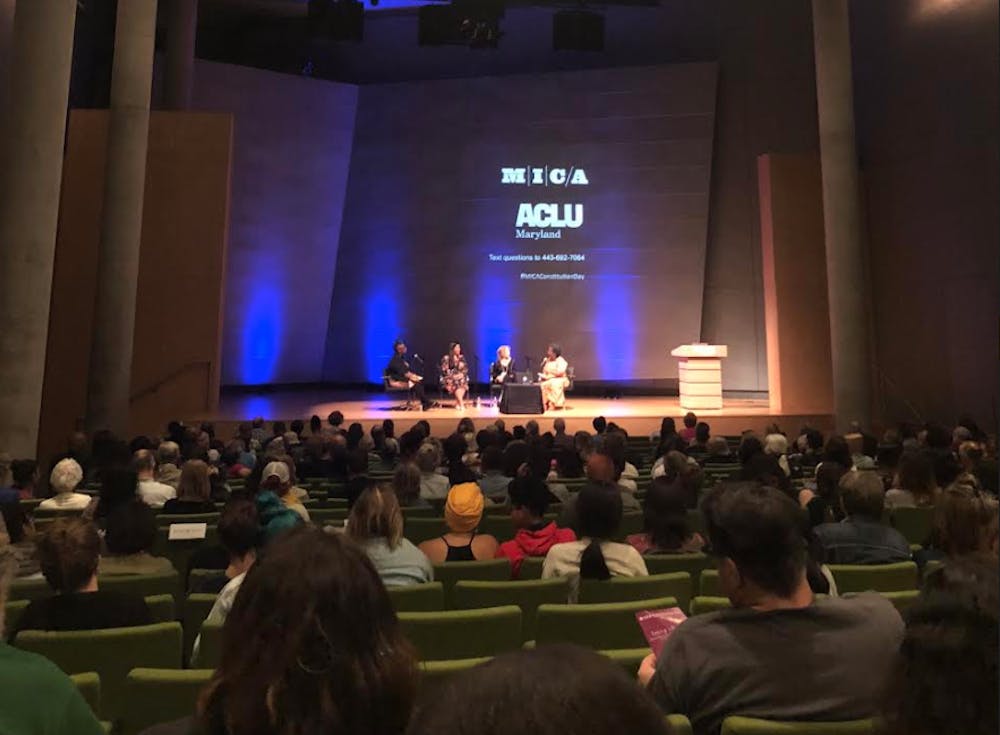In honor of Constitution Day, the Maryland Institute College of Art (MICA) and the American Civil Liberties Union (ACLU) of Maryland hosted a panel called Taking Liberties: Sexual Misconduct and Abuse of Power in the age of #metoo on Thursday, Sept. 20.
Carolee Schneemann, a visual artist, headlined the forum. Monica Ramirez, a civil rights attorney, and Kalima Young, a scholar and activist, were also panelists. Sheri Parks, the vice president for Strategic Initiatives at MICA, moderated the conversation.
The panel explored present-day gender-based violence and language, access to abortion and contraceptives, and the intersectionality of race and gender, among other topics.
Young began the conversation surrounding gender-based violence by discussing the “McKinney pool party.” At this 2015 McKinney, Texas pool party, police officer Eric Casebolt was recorded restraining Dajerria Becton, an unarmed 15-year-old black girl in a swimsuit. He was never indicted by a grand jury.
Young characterized this as an incident of gender-based violence.
“Gender-based violence refers to violence that is directed at an individual based on his or her biological sex, gender identity or perceived adherence to socially defined norms of masculinity and femininity,” Young said.
Young explored the idea of “empty empathy.” According to Young, when people hear of specific instances of gender-based violence in the news, they often fail to see it as part of a bigger trend because these stories lack context.
“Empty empathy occurs when we are invited to empathize with individuals who experience trauma without being provided the larger context for the existence of their trauma,” she said. “We get empathy that’s empty in a society of spectacle. We tend to read stories of gender-based violence as single units rather than evidence of oppression.”
Ramirez then discussed her work as the co-founder of the Alianza Nacional de Campesinas (the National Farmworker Women’s Alliance). She explored the intersection between gender and labor status, especially for farmers who do not receive much of the legal protection afforded to other workers.
“There are individuals who employ these women who believe that the women themselves, not just their labor, but the women themselves, belong to them, and that they can be treated however they want to,” Ramirez said. “They’re validated in some ways because they’re not provided with the [same] legal protections as every other worker across our country.”
Schneemann displayed a series of her work that tackles conventional culture. She began with Eye Body, a 1963 work of 36 images that focuses on the female nude. She noted that as a female painter, she often felt she had a lack of agency and authority. Schneemann used the images to reflect on that lack of agency and authority.
“These images are all about self-determination,” she said.
Schneemann also recalled her 1975 performance Interior Scroll, where she painted her body with mud and read from a paper scroll she extracted from her vagina.
She then stressed the importance of empathizing with women who have been abused or assaulted. She recounted her experience working with a group of students studying performative principles in Massachusetts. She wanted the women in the group to feel as if they could fight back against abuse and offered them the chance to use aggressive materials, such as weapons, in their performance art.
“They astonish me. The women go off together, and they come back in with blankets. And they ignore the weapons and the tough material, and they wrap each other up, and they do the most tender healing,” Schneemann said.
Following Schneemann’s photographic exhibition of her work, the panel opened into a question-and-answer session. Parks asked questions, and the audience were invited to either text their questions to the panelists or use the microphone.
MICA student Ladan Savar said that the panel motivated her to act out against gender-based violence and discrimination.
“It’s just so upsetting to know that this is still happening, and that I’m still sitting here just complaining, and I’m not doing anything, so it’s kind of just pushing me more to get my ass up,” Savar said.
MICA student Sarah Mac stated that she appreciated that the forum gathered so many people together to talk about issues of gender-based violence.
“It was really powerful, and I think that it’s overwhelming in the sense that this is stuff that isn’t talked about regularly, which it should be,” Mac said.





